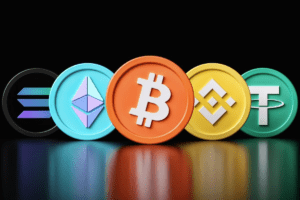Introduction to Solana
What is Solana?
Solana is a high-performance blockchain platform designed to provide fast and scalable solutions for decentralized applications (dApps) and cryptocurrencies. It was created by Solana Labs, a team of engineers and developers aiming to address the limitations of existing blockchain technologies.
At its core, Solana utilizes a unique combination of innovative technologies and protocols to achieve high transaction throughput and low latency. It employs a proof-of-history (PoH) consensus mechanism, which helps to order transactions and enables parallel processing. This approach enhances the scalability of the Solana network and allows for a larger number of transactions to be processed in a given time frame.
The Rise of Solana in the Cryptocurrency Space
Since its launch in 2020, Solana has gained significant attention and recognition in the cryptocurrency space. Its ability to handle thousands of transactions per second, coupled with low fees, has garnered interest from developers, investors, and users alike.
Solana’s rise in popularity can be attributed to its focus on scalability and performance. By introducing innovative features such as the Gulf Stream, a feature that optimizes block propagation, and Tower BFT, a fast and secure consensus algorithm, Solana has positioned itself as a promising blockchain platform for various applications.
Moreover, Solana has formed strategic partnerships with industry-leading projects and organizations, further solidifying its reputation. These collaborations have resulted in the development of decentralized finance (DeFi) applications, non-fungible tokens (NFTs), and gaming platforms on the Solana network.
With its focus on scalability, speed, and developer-friendly infrastructure, Solana has emerged as a compelling option for individuals and businesses seeking to build decentralized applications and explore the potential of blockchain technology.
To dive deeper into Solana’s tokenomics and its scalability features, check out our articles on Solana Tokenomics and Solana Scalability.
Understanding Solana Token
In order to grasp the significance of Solana in the cryptocurrency space, it is essential to understand what a Solana token is and the role it plays within the Solana ecosystem.
What is a Solana Token?
A Solana token refers to a digital asset that operates on the Solana blockchain. Solana tokens are built using the Solana protocol, which allows for the creation and transfer of tokens in a secure and decentralized manner. These tokens can represent various assets, such as cryptocurrencies, utility tokens, or even unique digital collectibles.
Solana tokens are based on the Solana blockchain, which is known for its speed, scalability, and low transaction fees. The Solana blockchain utilizes a unique combination of technologies, including a proof-of-history (PoH) consensus mechanism and a proof-of-stake (PoS) system, to ensure fast and efficient processing of transactions.
The Role and Function of Solana Tokens
Solana tokens serve multiple functions within the Solana ecosystem. They can be used as a medium of exchange, store of value, or even as a representation of ownership in a particular project or decentralized application (DApp). The specific role and function of a Solana token depend on the project or platform it is associated with.
One of the key advantages of Solana tokens is their ability to facilitate decentralized finance (DeFi) applications. These tokens can be utilized within smart contracts to enable lending, borrowing, and other financial activities in a trustless and transparent manner. For more information on Solana’s role in DeFi, you can refer to our article on solana tokenomics.
Solana tokens also play a significant role in the emerging market of non-fungible tokens (NFTs). NFTs are unique digital assets that can be bought, sold, and traded on the Solana blockchain. These tokens enable the creation and ownership of digital art, collectibles, and other unique digital assets. To explore the world of NFTs on Solana further, check out our article on solana scalability.
Furthermore, Solana tokens find applications in gaming and decentralized applications (DApps) built on the Solana blockchain. They can be used for in-game purchases, virtual land ownership, and other gaming-related activities. The high-speed transaction processing capabilities of Solana make it an attractive choice for developers looking to build scalable and immersive gaming experiences.
By understanding the concept of Solana tokens and their role within the Solana blockchain, one can gain a deeper appreciation for the potential applications and opportunities that Solana offers. As the Solana ecosystem continues to evolve and expand, the role of Solana tokens is expected to grow in significance.
In the next section, we will explore the broader Solana ecosystem, including the features, advantages, and potential use cases that make Solana a prominent player in the cryptocurrency market.
The Solana Ecosystem
As an innovative blockchain platform, Solana has gained significant attention in the cryptocurrency space. Understanding the Solana ecosystem is essential to grasp the potential of Solana tokens and their role in this dynamic network.
Exploring the Solana Blockchain
At the heart of the Solana ecosystem lies the Solana blockchain. Designed to address scalability challenges, Solana offers a high-performance blockchain infrastructure capable of handling a large number of transactions per second. The Solana blockchain achieves this scalability through its unique combination of features, including a proof-of-history (PoH) consensus mechanism, a Tower BFT (Byzantine Fault Tolerance) consensus algorithm, and a parallel processing system. These features work together to enable fast transaction processing and maintain the integrity of the network.
To dive deeper into the technical aspects of the Solana blockchain, you can refer to the Solana whitepaper. The whitepaper provides a comprehensive overview of the underlying technology and the innovative solutions that make Solana stand out in the blockchain landscape.
Key Features and Advantages of Solana
Solana offers several key features and advantages that contribute to its growing popularity in the cryptocurrency market. These features include:
Scalability:
The Solana blockchain is designed to handle a large number of transactions per second, providing scalability that surpasses many other blockchain platforms. This scalability is crucial for supporting decentralized applications (DApps) and enabling real-world use cases.
Fast Transaction Speeds:
Solana’s unique combination of consensus mechanisms and parallel processing allows for extremely fast transaction speeds. With low latency and high throughput, Solana enables near-instantaneous transaction confirmations, improving user experience and opening up new possibilities for various industries.
Low Transaction Costs:
By utilizing efficient consensus mechanisms and optimized resource allocation, Solana aims to keep transaction costs low. This makes it more accessible for developers, users, and businesses to participate in the Solana ecosystem without incurring excessive fees.
Robust Developer Tools and Support:
Solana provides a range of developer tools and resources to facilitate the creation of decentralized applications on its blockchain. These resources include a comprehensive developer documentation, software development kits (SDKs), and a growing community of developers passionate about building on Solana.
Vibrant Ecosystem and Partnerships:
Solana has garnered support from various industry players, including prominent projects and organizations. The Solana ecosystem is continuously expanding through strategic partnerships, collaborations, and integrations. These partnerships contribute to the growth and adoption of Solana, further enhancing its potential as a leading blockchain platform.
To gain insights into the future direction of Solana, you can explore the Solana roadmap. The roadmap outlines the planned developments, upgrades, and milestones that will shape the future of the Solana ecosystem.
As the Solana ecosystem continues to evolve, it presents a promising frontier for decentralized finance (DeFi) applications, non-fungible tokens (NFTs), gaming, and other exciting use cases. By leveraging its unique capabilities and advantages, Solana aims to provide a scalable, secure, and efficient blockchain infrastructure for the digital economy.
Use Cases for Solana Tokens
Solana tokens, built on the Solana blockchain, offer a wide range of use cases within the digital landscape. From decentralized finance (DeFi) applications to non-fungible tokens (NFTs) and gaming, Solana tokens are gaining traction in various sectors. Let’s explore some of the primary use cases for Solana tokens:
Decentralized Finance (DeFi) Applications
Decentralized finance, or DeFi, has emerged as one of the most significant use cases for blockchain technology. Solana’s fast and scalable infrastructure makes it an ideal platform for DeFi applications. With low transaction fees and high throughput, Solana enables efficient and cost-effective decentralized lending, borrowing, liquidity provision, and other financial services. DeFi projects built on Solana aim to provide users with transparent, secure, and permissionless access to financial products and services. The Solana ecosystem offers a wide array of DeFi protocols, including lending platforms, decentralized exchanges (DEXs), and yield farming opportunities.
Non-Fungible Tokens (NFTs) on Solana
Non-fungible tokens (NFTs) have gained immense popularity in recent years, revolutionizing the way we perceive and trade digital assets. Solana’s high-performance blockchain is well-suited for NFT applications, offering fast transaction speeds and low costs. Artists, creators, and collectors can leverage the Solana network to mint, buy, sell, and trade NFTs representing digital art, virtual real estate, collectibles, and more. The Solana ecosystem provides a vibrant marketplace for NFT enthusiasts, enabling them to explore unique and diverse collections.
Gaming and DApps on Solana
As the demand for blockchain-based gaming and decentralized applications (DApps) grows, Solana presents itself as an attractive platform for developers and users alike. Solana’s scalability and fast confirmation times allow for seamless gaming experiences, enabling real-time interactions and reducing latency. Developers can build innovative gaming DApps, including blockchain-based games, virtual worlds, and in-game economies, on the Solana blockchain. Solana’s low transaction fees and high throughput make it an enticing choice for gaming enthusiasts seeking immersive and secure gaming experiences.
By exploring these use cases, it becomes clear that Solana tokens have the potential to revolutionize various industries, offering scalability, speed, and cost-effectiveness. As the Solana ecosystem continues to evolve and attract new projects, the possibilities for Solana tokens are expanding. To learn more about Solana’s tokenomics and scalability, check out our articles on Solana tokenomics and Solana scalability.
The Future of Solana
As Solana continues to gain momentum in the cryptocurrency market, it is essential to explore the potential challenges and opportunities that lie ahead for this innovative blockchain platform.
Potential Challenges and Opportunities
While Solana has made significant strides in terms of scalability and performance, there are still challenges that may impact its future growth. One potential challenge is the increasing competition in the blockchain space. As more platforms emerge, Solana will need to continue demonstrating its unique value proposition and staying ahead of the curve in terms of technological advancements.
Additionally, regulatory developments and legal frameworks surrounding cryptocurrencies can present challenges for Solana and other blockchain projects. Adapting to evolving regulations and ensuring compliance will be crucial for Solana’s long-term success.
Despite these challenges, Solana also presents numerous opportunities. Its highly scalable and low-latency blockchain architecture positions it as a promising platform for decentralized applications (DApps) in various industries. Solana’s ability to process a high volume of transactions per second at minimal costs makes it attractive for developers and businesses looking to leverage blockchain technology.
Outlook for Solana in the Cryptocurrency Market
Given its impressive performance and growing ecosystem, the outlook for Solana in the cryptocurrency market is optimistic. Solana has gained recognition for its fast transaction speeds, low fees, and robust infrastructure, which have made it an attractive choice for developers and users alike.
The Solana community, composed of developers, validators, and users, continues to grow and contribute to the platform’s success. Solana’s partnerships with various organizations and projects further solidify its position in the market. These partnerships foster collaboration and innovation, creating new opportunities for Solana to expand its reach and applications.
In terms of market adoption, Solana has gained attention in the decentralized finance (DeFi) space, with several DeFi applications being built on the platform. The ability to support complex financial transactions and smart contracts positions Solana as a viable competitor to other established blockchain platforms.
As Solana continues to evolve and improve its technology, its roadmap for the future outlines ambitious goals. This includes enhancing scalability, expanding the ecosystem, and exploring additional use cases beyond DeFi, such as non-fungible tokens (NFTs) and gaming applications.
Overall, the future of Solana in the cryptocurrency market appears promising. With its robust technology, growing ecosystem, and strong community support, Solana is well-positioned to make a significant impact in the blockchain industry. To learn more about Solana’s roadmap and partnerships, visit our article on solana partnerships.



